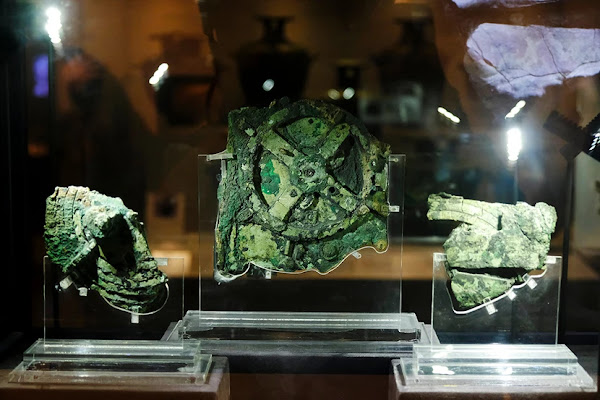Many of the tools and technologies we rely on today have roots that stretch far deeper into history than most realize. Long before the digital age, the ancient Greeks were laying the foundations for ideas and inventions that continue to shape modern life. From timekeeping to robotics, their innovations reveal a civilization driven by curiosity, creativity, and a deep understanding of science and engineering.
Who would have guessed the first alarm clock rang in antiquity, or that the earliest robot poured wine for dinner guests? Here are eight groundbreaking inventions from ancient Greece that are still very much part of our world today.
1. The Alarm Clock
A staple of modern life, the alarm clock was first conceptualized in 3rd-century BCE Greece. The inventor Ctesibius of Alexandria designed a sophisticated water clock with a built-in alarm mechanism. As water flowed into a chamber, it eventually triggered pebbles to fall onto a gong or into a metal dish—producing a sharp sound to wake its user.
Even Plato is said to have owned a version of a water clock that emitted a sound similar to a hydraulic organ to signal the start of lectures at dawn.
2. Automatic Doors
Centuries before motion sensors, the Greeks were already opening doors automatically. Heron of Alexandria, a brilliant 1st-century engineer, devised a system where fire lit on a temple altar would heat water in a sealed vessel. The resulting steam created pressure, which pushed water into a container that activated a system of pulleys and counterweights to open the temple doors—much to the awe of worshippers.
Heron also invented a coin-operated holy water dispenser and an early version of the syringe—testament to his mechanical genius.
3. The Odometer
The device that tracks distance in your car has roots in ancient Greek engineering. The first odometer is thought to have been developed in the 3rd century BCE and was later refined by both Archimedes and Heron. Though Roman engineer Vitruvius credited Heron, it’s likely Archimedes devised the original concept.
The odometer enabled more accurate road construction and navigation—key for both commerce and military operations.
4. The Lighthouse
The concept of the lighthouse began in ancient Greece, with a stone tower built at Piraeus, the port of Athens, in the 5th century BCE. A fire at its summit provided light to guide ships safely to harbor.
Later, the Lighthouse of Alexandria, constructed under Ptolemy II around 280 BCE, became one of the Seven Wonders of the Ancient World. Over 100 meters tall, it projected light using a furnace and mirrors, helping sailors navigate the treacherous Egyptian coastline.
5. Philon’s Mechanical Servant – The First Robot
In what may be the earliest example of robotics, Philon of Byzantium in the 3rd century BCE built an automatic servant—a device designed to pour wine for guests. The user placed a cup in the robot’s hand, triggering a valve that released wine. As the cup filled, the weight redirected airflow to a second container that added water, perfectly diluting the wine—just as Greeks preferred it.
This ingenious system relied entirely on pneumatics and hydraulics—no electricity required.
6. Plumbing and Showers
The ancient Minoans, Greeks living on Crete as early as 2000 BCE, developed advanced plumbing systems using underground clay pipes. Later, Greeks in Olympia and Athens refined these systems for public baths, fountains, and even private homes.
Lead piping supplied water to gymnasiums, where athletes used primitive showers. A vase from the era even depicts a man washing under a wall-mounted nozzle. In Pergamon, archaeologists discovered a large communal shower system with multiple nozzles—much like modern locker room showers.
7. The Antikythera Mechanism – The First Analog Computer
Discovered in 1901 in a shipwreck off the island of Antikythera, this bronze device puzzled researchers for decades. Only in the 1950s did scientists realize what they had: an ancient Greek analog computer, dating back to around 150 BCE.
Roughly the size of a shoebox, the Antikythera Mechanism used a complex system of gears to track celestial movements, predict lunar phases and eclipses, and even identify the dates of the Olympic Games. It could model the positions of the Sun, Moon, and five known planets with astonishing accuracy.
Scholars now believe it was based on the astronomical work of Hipparchus or possibly Archimedes, blending Greek innovation with Babylonian star charts.
8. The Foundations of Modern Engineering
Beyond these specific inventions, the Greeks pioneered mechanical principles still used today. From Archimedes’ screw to Heron’s steam engine prototype (the aeolipile), ancient Greek thinkers laid the groundwork for hydraulics, pneumatics, and automation.
Their influence also extended to geometry, optics, and even urban planning—demonstrating a holistic approach to science and technology that shaped future civilizations.
Conclusion
These ancient innovations weren’t just clever for their time—they were visionary. The Greeks imagined machines that mimicked life, calculated the movements of the cosmos, and made daily routines more efficient. Thousands of years later, their ideas still resonate, embedded in the technologies we take for granted.
Ancient Greece wasn't just the birthplace of democracy and philosophy—it was a hub of invention that continues to define the modern world.















